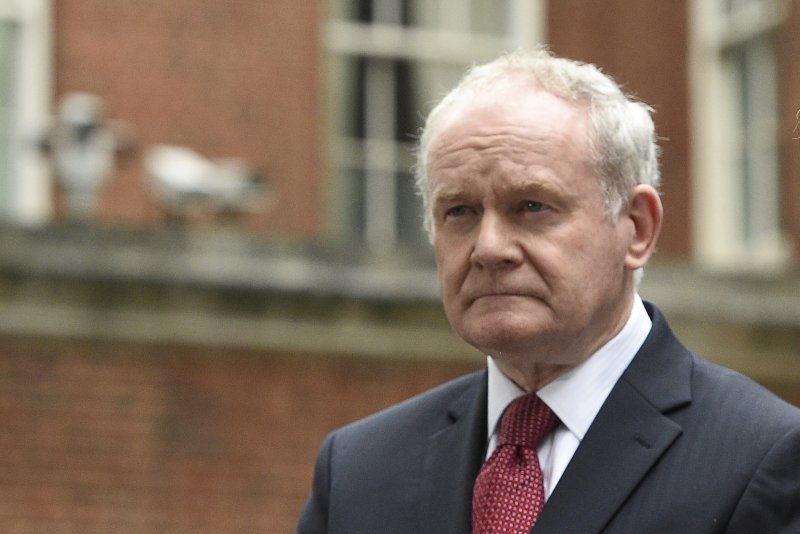1 of 2 | Then-Northern Ireland Deputy First Minister Martin McGuinness speaks to journalists after attending a meeting of the Joint Ministerial Committee at 10 Downing Street in London on October 24. McGuinness died Tuesday, at age 66 at Altnagelvin Area Hospital in Derry, Northern Ireland. File Photo by Facundo Arrizabalaga/EPA
March 21 (UPI) -- Martin McGuinness, 66, former Irish Republican Army commander turned politician and peacemaker, died Tuesday, his Sinn Fein political party announced.
The cause of McGuinness' death wasn't reported, but in December, doctors diagnosed him with a rare heart disease.
From 1970, McGuinness played a prominent role in the violent, 30-year campaign to end British rule in Northern Ireland. By age 21 he was a street fighter and IRA leader, a group classified as a terrorist organization by British and U.S. authorities. More than 3,600 people died in the sectarian conflict. When Sinn Fein, the legal and public face of the IRA, began its campaigns for elections in the 1980s, McGuinness was still a promoter of violence in his hometown of Derry.
McGuinness was frequently arrested and interrogated, but, thoroughly radicalized to his cause, the actions had no effect. In 1972 he was arrested for attempting to import explosives and ammunition from the Republic of Ireland. Following his parole from prison in 1974, McGuinness was responsible for some of the IRA's largest and most divisive attacks, with tactics including use of car bombs as weapons and random firing of weapons at British soldiers sent to maintain order in Northern Ireland.
"We don't believe that winning elections and any amount of votes will bring freedom in Ireland," he said in 1986, a time in which Sinn Fein had already made inroads in the country's government and political process. "At the end of the day, it will be the cutting edge of the IRA that will bring freedom."
Within several years he was involved in seeking peaceful solutions with Britain. Even as a man on the run, McGuinness met with undercover British intelligence agents in search of peace. Negotiations eventually led to a truce, with McGuinness also playing a role in bridging Northern Ireland's hardliners and its peace faction. The archetype of urban violence became a political leader at the heart of Northern Ireland's government.
He was deputy first minister of Northern Ireland until he stepped down in January.
Sinn Fein President Gerry Adams paid tribute to McGuinness on Tuesday, telling Ireland's Radio One in an interview, "We wouldn't be where we are without him. Martin led the IRA when there was a war but Martin led the IRA into peace. He genuinely believed in reconciliation, even when it made people uncomfortable," he added.















